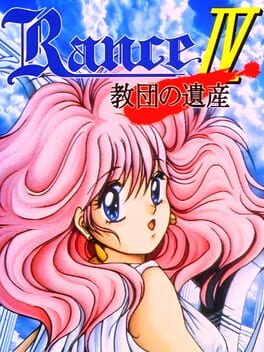The final chapter is an atrocious mess that pukes one badly designed boss after another at you without any thought.
In any case.
It's weird how the main thematic question of Rance 4 is dismissed by fans: The dichotomy between Bitch and Rance.
Over and over, the game forces you to question what, really, the difference between the protagonist and the villain are. It goes so far as to replicate the exact same scene of the two: Bitch complains about his companions being the reason for his failure, a few hours later in the game, Rance does the same thing.
At the same time, this makes the answer as clear as day, and shows why Rance can live on and Bitch goes on to die as a nobody: Rance thrusts forward.
Bitch always chooses the easy way out, he would rather live a stagnant life if it meant not having to care for anything.
While Rance never accepts lying down, he ALWAYS chases after the future. "A boring-ass ending where everything is set out is not worth his time."
In the final chapter, this is again clearly shown by him choosing to lazily fooling around with Io instead of taking care of the issue immediately when he still had the chance. While it doesn't make much sense at this time of the story for him to accept a trade with Bitch (especially not after seeing what he did to Merim), it makes sense thematically. He gets the just punishment for taking the easy way out, by having to fight a million more enemies and almost losing everything he loves.
Simultaneously, this is what makes Rance such a strong comedic character. Many times, what seems like an incredibly stupid and thoughtless action is forgiven by the story, just because he's Rance. He has such ridiculous luck that he gets out of danger even if he shouldn't have over and over again. He is a bug in the system, and doesn't play by the world's rules. Still, this doesn't mean that he can do whatever the hell he wants, it just means that the narrative is more lenient with him for, among other reasons, comedic effect.
In any case.
It's weird how the main thematic question of Rance 4 is dismissed by fans: The dichotomy between Bitch and Rance.
Over and over, the game forces you to question what, really, the difference between the protagonist and the villain are. It goes so far as to replicate the exact same scene of the two: Bitch complains about his companions being the reason for his failure, a few hours later in the game, Rance does the same thing.
At the same time, this makes the answer as clear as day, and shows why Rance can live on and Bitch goes on to die as a nobody: Rance thrusts forward.
Bitch always chooses the easy way out, he would rather live a stagnant life if it meant not having to care for anything.
While Rance never accepts lying down, he ALWAYS chases after the future. "A boring-ass ending where everything is set out is not worth his time."
In the final chapter, this is again clearly shown by him choosing to lazily fooling around with Io instead of taking care of the issue immediately when he still had the chance. While it doesn't make much sense at this time of the story for him to accept a trade with Bitch (especially not after seeing what he did to Merim), it makes sense thematically. He gets the just punishment for taking the easy way out, by having to fight a million more enemies and almost losing everything he loves.
Simultaneously, this is what makes Rance such a strong comedic character. Many times, what seems like an incredibly stupid and thoughtless action is forgiven by the story, just because he's Rance. He has such ridiculous luck that he gets out of danger even if he shouldn't have over and over again. He is a bug in the system, and doesn't play by the world's rules. Still, this doesn't mean that he can do whatever the hell he wants, it just means that the narrative is more lenient with him for, among other reasons, comedic effect.
